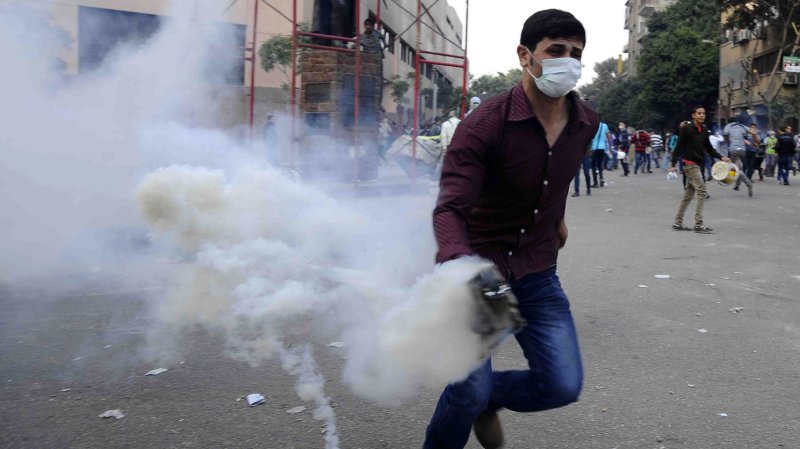Egyptian protester runs with teargas canister during battles with riot police during large demonstration against President Mohamed Morsi, in Tahrir Square, Cairo, Egypt, on November 27, 2012. UPI/Mohammad KHalil |
License Photo
CAIRO, Nov. 29 (UPI) -- The U.S. Embassy in Cairo closed Thursday after fighting between protesters and police blocked access to the building.
The clashes stem from Egyptian President Mohammed Morsi's refusal to back away from a showdown over his decree granting himself near absolute power, CBS News reported.
CBS said the protesters were targeting riot police, not the U.S. Embassy in the confrontations occurring near the diplomatic compound.
Most embassy staff were gone, and the embassy was closed for all American citizen services, officials said.
Activists warn Morsi's actions could spark a "second revolution" for the democratically elected Islamist president who enjoys support of the nation's most powerful political movement, the Muslim Brotherhood.
Meanwhile, Egypt's Constituent Assembly began voting on the draft constitution, approving 40 of the 234 articles to the new constitution one by one, The Egypt Independent reported.
The first article, approved unanimously, states Egypt is an independent, sovereign, democratic state and a part of the Arab and Islamic nation and the African continent, Article 2 states the principles of Sharia [Islamic law] are the primary sources of legislation and Article 3 gives personal religious freedom the Christians and Jews.
A copy of the draft constitution is to be submitted to Morsi Saturday, the Independent said. The current draft retains controversial clauses not agreed upon by different political parties.
Analysts have described the draft as an effort to defuse the positions of the military and other Islamist forces polarized by Morsi's decree.
The state-run al-Ahram newspaper reported lawmakers approved an article that would allow civilians to be tried by the military for crimes that "harm the armed forces."
The draft also establishes a National Defense Council that doesn't include lawmakers on the panel other than speakers of both parliamentary chambers, the Independent said.
The draft also states "the principles of Islamic Sharia [law] shall include full evidence, orthodox and jurisprudent rules, and sources approved by schools of the Sunnis and the community."
Al-Ahram said members of the Constituent Assembly agreed Wednesday on an electoral system in which a third of Parliament would be elected by single-winner voting and the remaining two-thirds would be elected through party lists. In June, the Supreme Constitutional Court ruled regulations governing a similar system were unconstitutional, which led to the dissolution of the People's Assembly.















